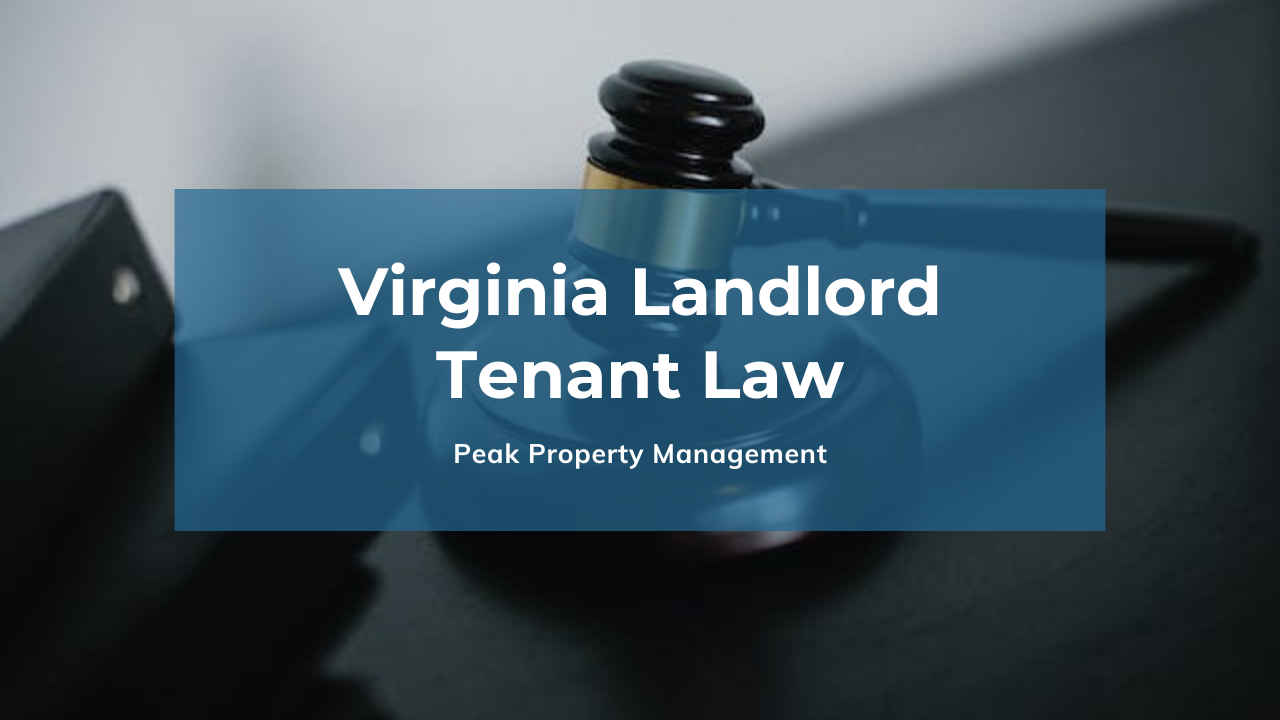Key Takeaways
Landlord-tenant laws are some incredibly important rules to be fully informed of as a landlord.
Ignorance or negligence of these laws could land you in legal trouble.
Partnering with a professional management team can ensure legal compliance and make your rental journey easier.
When operating a rental in Virginia, it’s essential that you familiarize yourself with the state’s Residential Landlord and Tenant Act (VRLTA). It provides a legal framework for residential tenancies, including the rights and responsibilities of both the landlord and the tenant, as well as important topics like security deposits, habitability requirements, landlord entry, and required disclosures.
Please note, however, that the Virginia Residential Landlord and Tenant Act only applies after the landlord has established a lease. In Virginia, that comes about if there is a verbal or written rental agreement, or if the landlord accepts a payment as rent.
This blog by Peak Property Management will provide you with a comprehensive overview of the VRLTA. This way, you’ll be able to avoid noncompliance issues and possible conflicts or misunderstandings with the resident.

Required Landlord Disclosures in Virginia
Landlords in Virginia must disclose the following information to residents before they can move in.
Concentrations of lead-based paint if renting out a house built before 1978.
A move-in checklist with a description of the rental unit’s inventory and the property’s condition.
A statement regarding the rights and responsibilities the resident has.
The total rent to pay and any other cost they might incur under the lease agreement.
The name and address of the rental property owner and manager (if any).
Whether the rental is in an ordinance location.
Whether any parts of the drywall are defective.
A disclosure on whether you have any knowledge of the dwelling being used in the past to manufacture meth.
A disclosure on whether there is mold in the unit.
The formula for sharing utility payments between residents.
A disclosure on whether you’ll be demolishing the unit during the term of the lease.
Virginia Tenants’ Rights & Responsibilities
Generally speaking, residents in Virginia obtain the following rights after establishing a lease agreement with a landlord. A right to:
Occupy livable premises.
Be treated fairly per the Fair Housing Act in Virginia.
Be notified before termination of a periodic tenancy, like when on a month-to-month lease.
A proper eviction procedure, which is devoid of illegal procedures like shutting down of utilities or removal of personal belongings.
Get a refund of the security deposit, minus any allowable deduction, within 45 days after moving out.
Break the lease for legally justifiable reasons, like after being a domestic violence victim.
Get a 72-hour’ advance notice before a landlord can access the unit.
When it comes to responsibilities, they include the following.
Keep the premises clean, sanitary, and habitable.
Keep the plumbing, facilities, and fixtures clean.
Pay rent on time, every month, and pay for utility services when payment becomes due.
Not cause negligent or deliberate damage to the property.
Not disturb the peace and quiet of other residents and neighbors.
Not tamper with the functioning of the smoke or carbon monoxide detector.
Notify the landlord before breaking the lease.
Abide by all policies in the lease agreement, such as the pet policy.

Landlords’ Rights & Responsibilities in Virginia
Equally, the Virginia Residential Landlord-Tenant Act grants landlords the following rights in a lease.
Charge residents who break their lease without a legally justifiable reason.
Change the monthly rent cost by any amount and do so as frequently as you choose.
Enter the rented premises after providing 72 hours of advance notice.
Not to provide a grace period before charging a fee for unpaid rent, unless the lease says otherwise.
Charge up to 2 months’ rent as a security deposit.
Terminate the periodic tenancy of a resident after serving them the appropriate advance notice.
Evict residents who fail to observe the terms of the lease.
These rights aren’t without responsibilities, though. In Virginia, landlords must do the following in a landlord-tenant relationship.
Make necessary repairs to the rental within 14-21 days after getting notified.
Keep residents’ security deposits per the state’s security deposit rules.
Make a reasonable effort to re-rent the unit after a resident breaks the lease unjustifiably.
Notify the resident before a rent increase. The notice period for residents on a month-to-month lease is 30 days.
Abide by the state’s anti-discrimination rules.
Notify the resident at least 72 hours before entering their rented premises.
Provide the resident with the required disclosures.
An Overview of the Landlord-Tenant Laws in Virginia
Landlord's Right to Entry
Landlords can enter rented premises to perform crucial responsibilities. Such as, inspections, repairs, maintenance, and when responding to emergencies. But save for emergencies, you must notify the resident before entering the rental. This is usually at least 72 hours before the entry.
Housing Discrimination
In Virginia, you must treat residents fairly, regardless of 8 protected classes. The classes are: race, color, religion, disability, familial status, sex, nationality, and age. The agency that handles enforcement of the housing discrimination laws in the state is the state’s Fair Housing Board.
Rent Increases
There is no rent control law in Virginia, and Virginia law prohibits local jurisdictions from enacting their own laws.

But before you can raise it, you must provide the resident with an advance notice. For residents on a month-to-month lease, you must provide them with a 30 days’ notice. For tenants that pay weekly, the requirement is at least a 7 days’ notice.
Security Deposits
You can collect a security deposit in Virginia. However, there are rules that you must keep when you do so. For example, the maximum amount you can collect is capped at 2 months’ rent. Also, the timeline for its return is 45 days after the resident moves out.
Conclusion
The journey to a smooth rental ownership experience begins with understanding your legal responsibilities. Luckily for you, now you have a comprehensive overview of what that entails when operating a rental in Virginia.
If you have a question or need expert property management help, look no further than Peak Property Management. Our full array of management services can guarantee you an optimal ROI and peace of mind. Get in touch to learn more!











